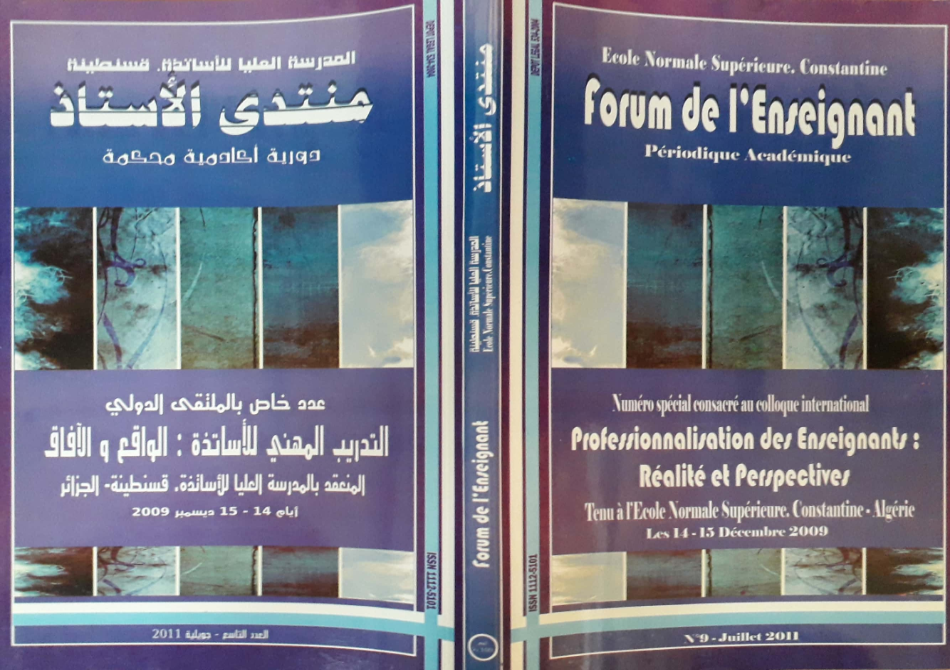Professionalization and universalization of teacher training in Algeria and elsewhere
Abstract
The subject of professionalization of primary and middle cycle teachers represents a widespread choice for the majority of Western countries. Algeria adopted the same choice and began its application 10 years ago for the primary cycle, because it was decided to recruit primary school teachers, provided that they hold a license. The teachers were also promoted to the rank of licensed primary school teacher as recognition of their higher level. However, teacher training in Algeria is far from being provided within university institutions dedicated to this purpose. The concept of professionalization comes from the term 'profession', defined by the ability of the professional to present a discourse derived from a science mastered by his specialist independently of place and time. The problem raised regarding the functioning of education is summed up in a fundamental question: does teaching in the primary cycle require a qualification of a high scientific level? or does it remain an art subject to the skills of each teacher? This question has been raised in developed countries such as France and Switzerland, each according to its experiences and historical conditions unlike Algeria which chose the apprenticeship model without taking into account the specificities of its school system. Worse, the decision to abandon educational technological institutes today has presented teacher training policy with a gap that is difficult to fill.
Downloads
References
-A. De Pereti : La formation des personnels de l’éducation nationale. Rapport au ministre de l’éducation nationale. 1982
-Bernard REY (2009) : Autour des mots « compétence » et « compétence professionnelle ». Recherche Et Formation. N°60. 2009. Paris. INRP
-R. Bourdoncle ( 1991) : La professionnalisation des enseignants : analyses sociologiques anglaises et américaines : 1.La fascination des professions. Revue française de pédagogie, N° 94
-Charte relative aux principes directeurs de la réforme du recrutement et de la formation des enseignants. CPU. 18 septembre 2008
-J.M. Chapoulie. Sur l’analyse sociologique des groupes professionnels. Revue Française de Sociologie. XIV. 1973
-J.C. Eicher. ( 2002) . Les IUFM en France : une réforme majeure de la formation des maîtres en France. In L’école algérienne au miroir des interactions pédagogiques et sociales de ses maîtres. Actes du colloque international. Tlemcen
-G.Dehier. Individu et Société. Détermination et indétermination. In Sociologie contemporaine. S/s la direction de J.P.Durand & R.Weil .Editions VIGOT. Paris. 1990.
-Rita Hofstetier, Bernard Scneumy, Valérie Lussi Borer (2009) : Une formation professionnelle universitaire pour tous les enseignants : l’exemple de la Suisse au XXé siècle. In Recherche Et Formation. N°60.. Paris. INRP
-G. Laplassade. Guerre et paix en classe. A. Colin éditeurs. Paris. 1994.
-Denis Legros et Ali Mecherbet (Sous la direction) (2009) : Cognition, Apprentissage et Enseignement :Compréhension, Production de textes et Construction de connaissances en langue étrangère et seconde en contexte plurilingue. Kounouz Editions. Tlemcen
-M. Lemosse. Le « professionnalisme » des enseignants : le point de vue anglais. Revue Recherche et Formation. No6.1989
-Pierret. J : Enseignement et professionnalisation. Cahiers pédagogiques. N° 281. Février 1990
-Morris.Rosenberg. Facteurs influençant le changement du métier. In Textes de Psychologie sociale.





